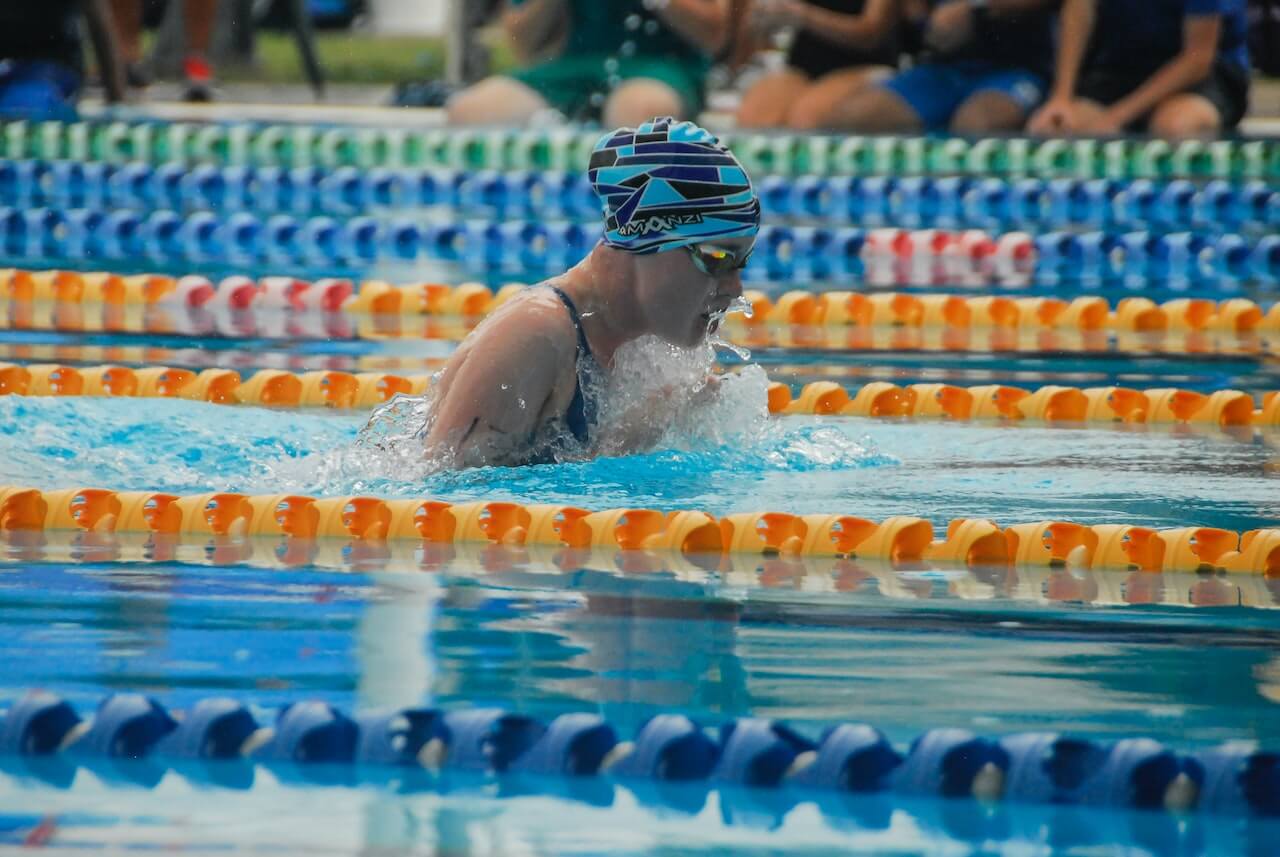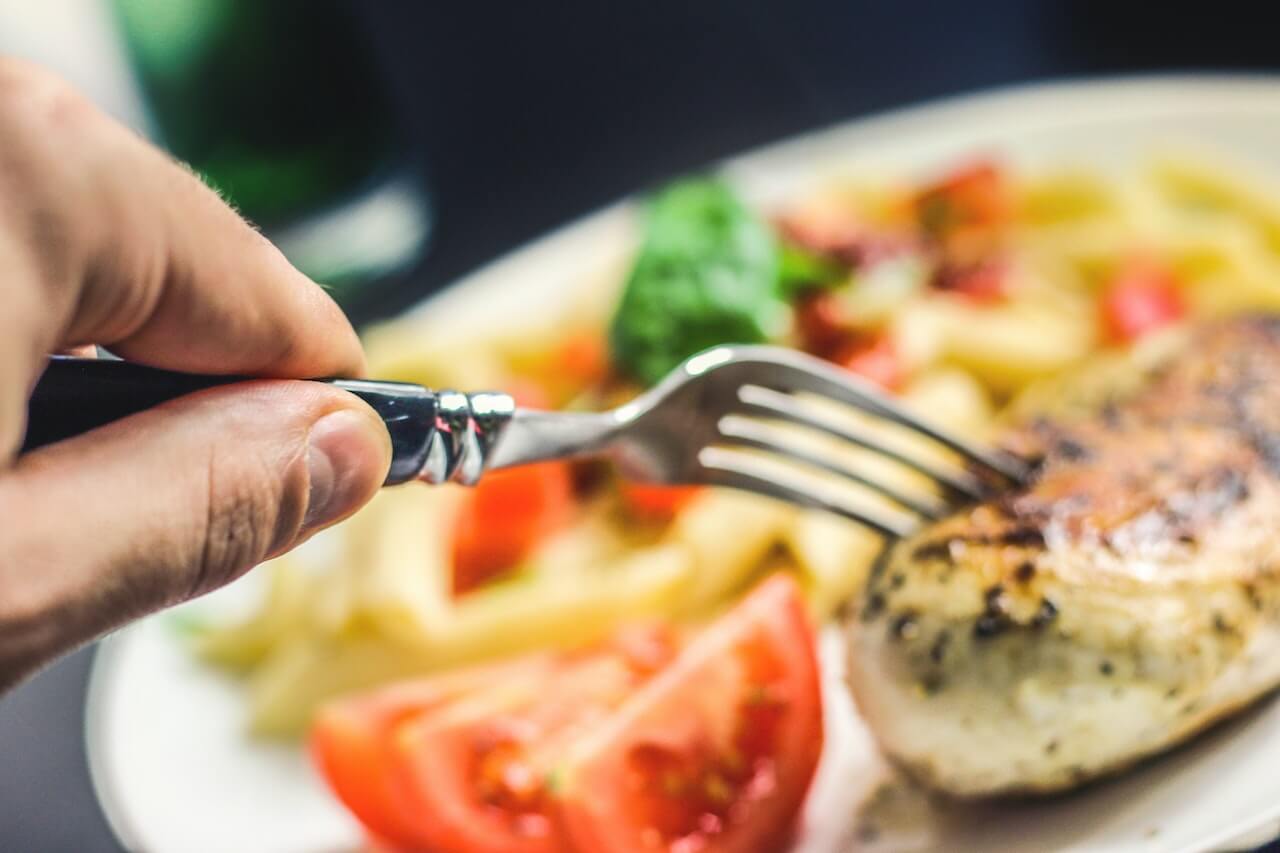The feeling of hunger after swimming is no coincidence, as the cool water temperature and specific swim strokes can cause you to burn a substantial amount of calories. Naturally, you’ll want to eat to refuel your body, but when you’re feeling so ravenous it is very easy to overeat and gain weight. So how can you prevent this?

To curb hunger after swimming, adopt effective strategies like timing your meals, staying hydrated, practicing mindful eating, and eating nutrient dense, satiating foods. Be mindful of your emotional and habitual hunger and find ways to manage them. Combining these tactics can help you make informed choices that promote a healthy, balanced diet and keep post-swim cravings at bay.
In this article, we’ll explore the reasons behind this hunger surge and share some helpful tips to keep post-swim appetite in check.
Understanding the Science Behind Hunger and Swimming
Swimming is a fantastic form of exercise, but you might’ve noticed that it often leaves you feeling extremely hungry afterward. To help curb this post-swim hunger, you must first understand the science behind it to help you better deal with the issue.
The Role of Energy Expenditure in Swimming

Swimming demands a lot from your body, and as a result, you burn a significant number of calories during your workout. In addition to calories burned from the workout itself, the process of thermoregulation plays a major role here.
When you swim, especially in cold water, your body works harder to maintain its core temperature, which increases your energy expenditure. Furthermore, swimming engages multiple muscle groups, enhancing your overall calorie burn.
To keep your energy levels stable, you need to replenish the nutrients lost during your swim. This is where a well-balanced meal, rich in protein and complex carbohydrates, comes in handy.
Stick with low-GI foods like quinoa, whole grains, and legumes (such as peas and chickpeas) to keep your blood sugar levels stable and prevent overeating.
Hormonal Responses to Swimming
Another reason you feel hungry after swimming is due to hormonal fluctuations. When you engage in aerobic exercise like swimming, your body produces the hormone ghrelin, which stimulates your appetite. This hunger-causing hormone signals your brain that you need more fuel to recover from your workout.
To counteract this hormonal response, focus on consuming nutrient-dense foods and staying well-hydrated.
Water plays a vital role in maintaining your body temperature and ensuring proper digestion. So, drinking enough warm water during and after your swim will not only help you stay hydrated but also help suppress hunger.
Include high-quality proteins, such as eggs or lean meats, in your post-swim meal to support muscle tissue recovery. Incorporate healthy fats from sources like nuts, seeds, and avocados to keep your hormones in check and contribute to your overall sense of fullness.
Remember to include plenty of fruits and vegetables in your diet, as they are filled with vitamins, minerals, fiber, and antioxidants, which can aid with digestion, energy levels, and recovery.
Tips and Strategies to Curb Hunger After Swimming
Timing Your Meals

To manage hunger after swimming, plan your meals around your workout schedule. Try having a carbohydrate-rich snack 30-60 minutes before you swim, which can help fuel your activity and reduce hunger afterward.
After your workout, a meal rich in protein and carbohydrates helps your body recover and satisfies your hunger, preventing excessive food intake later on. Don’t wait too long after your swim to eat, as your hunger can lead to overeating and reduced energy levels.
Hydration
Staying hydrated is crucial when it comes to curbing hunger after swimming. Water not only quenches your thirst but can also help in maintaining a feeling of fullness, thus reducing your appetite.
Drinking water throughout the day, before and after swimming, prevents dehydration, which can sometimes be mistaken for hunger. In addition, water can help you feel refreshed and energized during and after your swim.
Drinking warm water during and after swimming can help keep your core body temperature high and stave off hunger a bit longer.
Mindful Eating

Practicing mindful eating helps in managing hunger and appetite after swimming. Instead of mindlessly eating food, take time to savor each bite, chew slowly and fully, and pay attention to the taste, texture, and aroma.
This conscious effort allows your brain and digestive system to register satisfaction and fullness, reducing the likelihood of overeating. Furthermore, being mindful when eating helps you make better food choices, focusing on nutrient-rich options that support your fitness goals.
Choosing the Right Snacks

Selecting the right snacks is essential for managing hunger and supporting recovery after swimming. Focus on nutrient-dense foods that are rich in protein, healthy fats, vitamins, minerals, and fiber. Some great options include:
- Greek yogurt with fruit or seeds
- A handful of nuts or trail mix
- Carrot sticks with hummus or whole-grain toast with avocado
- Apple slices with almond butter
- A small serving of quinoa or brown rice with grilled chicken and steamed vegetables
These snacks provide a balanced combination of macronutrients, keeping your energy levels up and curbing hunger after swimming. Listen to your body and adjust your food intake according to your changing energy demands and the intensity of your workouts.
Overcoming Emotional and Habitual Hunger
Emotional Eating
Emotional eating can be a significant factor in experiencing hunger after swimming. When you eat to satisfy emotional needs or suppress negative feelings, you’re not genuinely addressing the root cause of the issue. To curb emotional hunger after swimming, consider the following:
- Identify your triggers: Are you feeling stressed, bored, or upset? Recognize the emotions driving you to eat and consider healthier alternatives to cope, such as meditation or deep breathing.
- Journal your emotions: Write down your feelings before and after swimming to track patterns in your emotional eating. This can help you better understand your emotions and create a plan for healthier coping mechanisms.
- Practice mindfulness: To avoid emotional eating, try sitting quietly and focusing on your breath or doing a body scan to relax areas of tension. You can also listen to guided meditations or bring awareness to your surroundings.
Habitual Hunger
Habitual hunger is the physical sensation of being hungry, even when you’re not truly in need of food. This can often be caused by habits associated with specific activities, such as snacking whenever you’re in front of the TV.
To break the habitual hunger cycle, consider these techniques:
- Establish a healthier routine: Create a consistent schedule for your swim sessions and meals, such as a light snack before swimming and a larger meal afterwards. This helps your body understand when to expect food and reduces the chance of habitual hunger.
- Eat balanced meals: Make sure your pre- and post-swim meals include protein, healthy fats, and complex carbohydrates. This combination will leave you feeling satisfied and reduce the urge to eat out of habit.
- Hydrate before and after swimming: Drinking water before and during your swim session may help reduce false hunger signals. After swimming, consuming an electrolyte-filled beverage can help replenish your body and prevent you from overeating.
It’s normal to feel somewhat hungry after engaging in physical activities like swimming. However, distinguishing between emotional and habitual hunger will help you better satisfy your needs without overindulging or disrupting your diet goals.
Sources:

